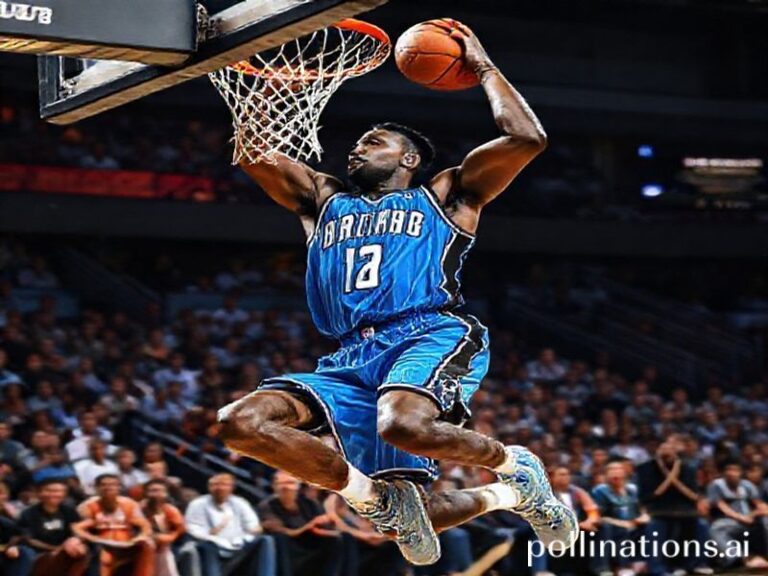Travis Kelce’s $70 Million Empire: How a Tight End Became a Global Soft-Power Asset
The Glorious Commodification of a Tight End, or How Travis Kelce Became a Walking Sovereign Wealth Fund
PARIS — While French pensioners protest the rise in retirement age to 64, an American man whose primary job is to catch an inflated leather ovum has quietly amassed a net worth north of US $70 million—enough, if converted to CFA francs, to vaccinate every child in Senegal twice and still leave change for croissants. Travis Kelce, Kansas City Chiefs tight end, human highlight reel, and—thanks to a recent dalliance with pop music’s reigning export—global tabloid catnip, now occupies a financial tier previously reserved for minor Gulf monarchs and the more industrious arms dealers.
Let us pause and genuflect.
The raw numbers, stripped of romance: $14 million per year in NFL salary, another $5 million or so annually from Nike, McDonald’s, and a dizzying array of brands that would like you to believe eating cereal will make you 6’5″ and able to hurdle Texans. Throw in a freshly inked two-year extension that could balloon to $34 million, sprinkle some podcast revenue (because every athlete now needs a podcast the way every Victorian needed gout), and you arrive at the tidy sum that has Bloomberg reporters using words like “liquidity event” and “brand architecture” without visible shame.
But the international angle, dear reader, is where this tale curdles from mere American excess into planetary farce. Kelce’s wealth is not just American; it is aggressively, shamelessly global. His endorsement money is routed through Dutch holding companies, his sneakers stitched in Vietnam, his streaming stats compiled in Dublin data centers, and his fame—ah, his fame—beamed into Rwandan living rooms via Chinese-made televisions tuned to NFL Game Pass. The world’s poor literally assemble the devices that broadcast the man who earns more per Instagram story than they will in a lifetime. If irony had a sound, it would be the gentle suction of a container ship leaving Ho Chi Minh City.
Meanwhile, the man himself is reportedly “just a fun-loving guy from Cleveland who likes to dance.” This is the preferred narrative, and it sells extraordinarily well from Singapore to São Paulo, where fans wearing knock-off Kelce jerseys (stitched in the same factories, naturally) speak of him as though he were a benevolent deity who grants touchdowns to the worthy. The jerseys retail for $129.99; the workers who stitch the nameplate earn roughly 47 cents per hour. Somewhere, an MBA student writes a case study celebrating “supply-chain efficiency.”
The geopolitical implications? Subtle, but real. The NFL, once a provincial American circus, now stages regular-season games in Frankfurt and London, where British fans—who used to reserve such tribal passions for proper football—now perform the Arrowhead Chop with the gusto of colonials appropriating a more violent cricket. Kelce, blond mane flowing, becomes a soft-power export: capitalism’s answer to the Bolshoi Ballet. The U.S. State Department does not officially track “tight-end diplomacy,” but if it did, Kelce would be a one-man USAID program, minus the altruism.
And then there is the Swift variable. When Taylor Swift began appearing at Chiefs games, the league’s international viewership spiked 63 percent, a surge that coincided neatly with the collapse of several smaller streaming platforms in Southeast Asia—casualties, one assumes, of bandwidth being siphoned to watch a billionaire singer watch her linebacker-adjacent boyfriend. Kelce’s net worth, already buoyant, is now tethered to the GDP of a medium-sized Balkan nation. If the relationship ends, analysts predict a mere 4 percent dip; if it leads to marriage, expect a joint fragrance line and, possibly, a small currency devaluation in countries overly reliant on Swiftian tourism.
In the end, the man is worth what we collectively decide he is worth—an axiom that applies equally to gold, Bitcoin, and the delicate egos of nation-states. Somewhere in the Hague, a war-crimes lawyer takes a break from genocide filings to check Kelce’s latest endorsement deal and sighs at the arithmetic of human attention. And still the container ships sail on, carrying sneakers, dreams, and the quiet, durable hope that somewhere, somehow, someone is keeping score.







